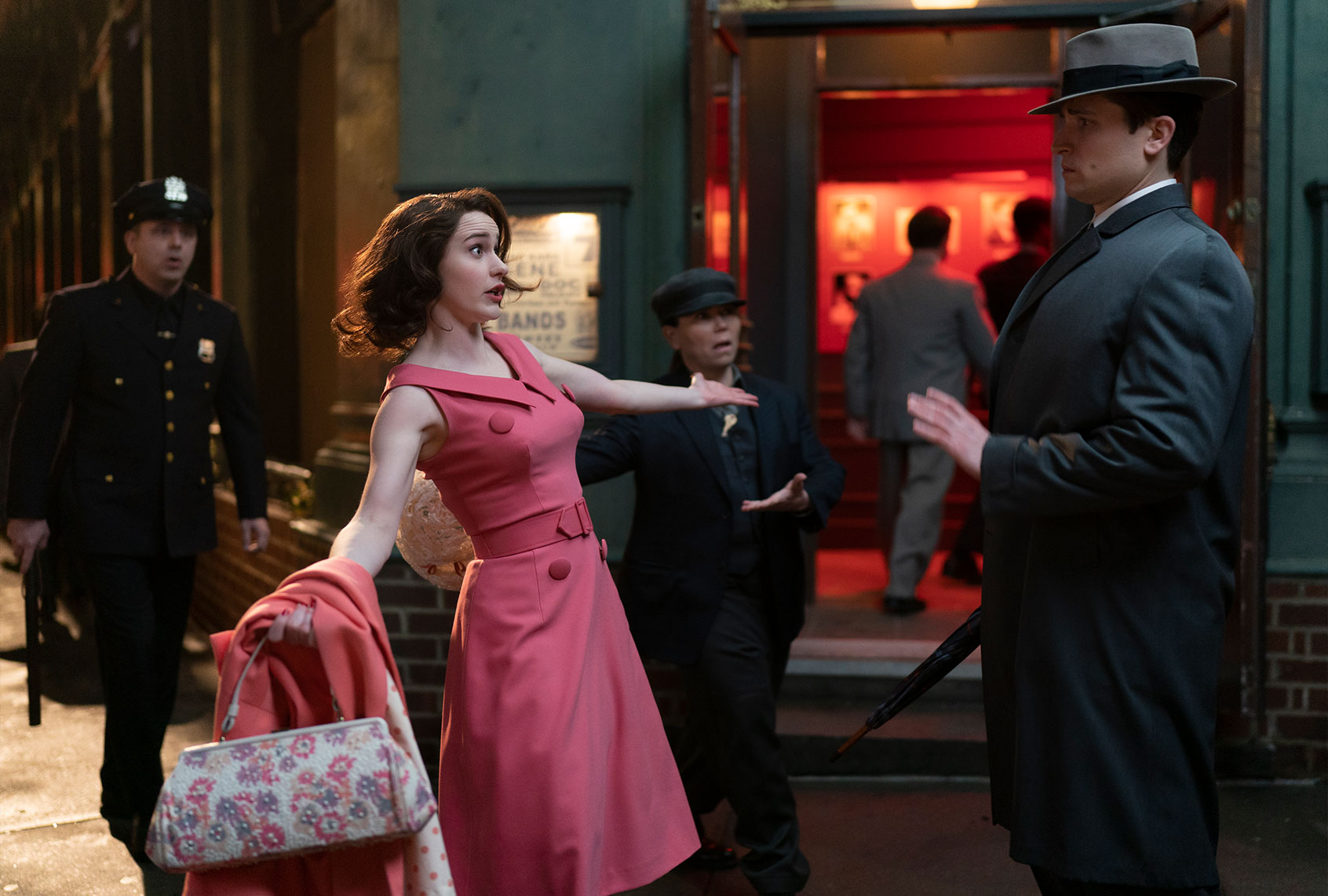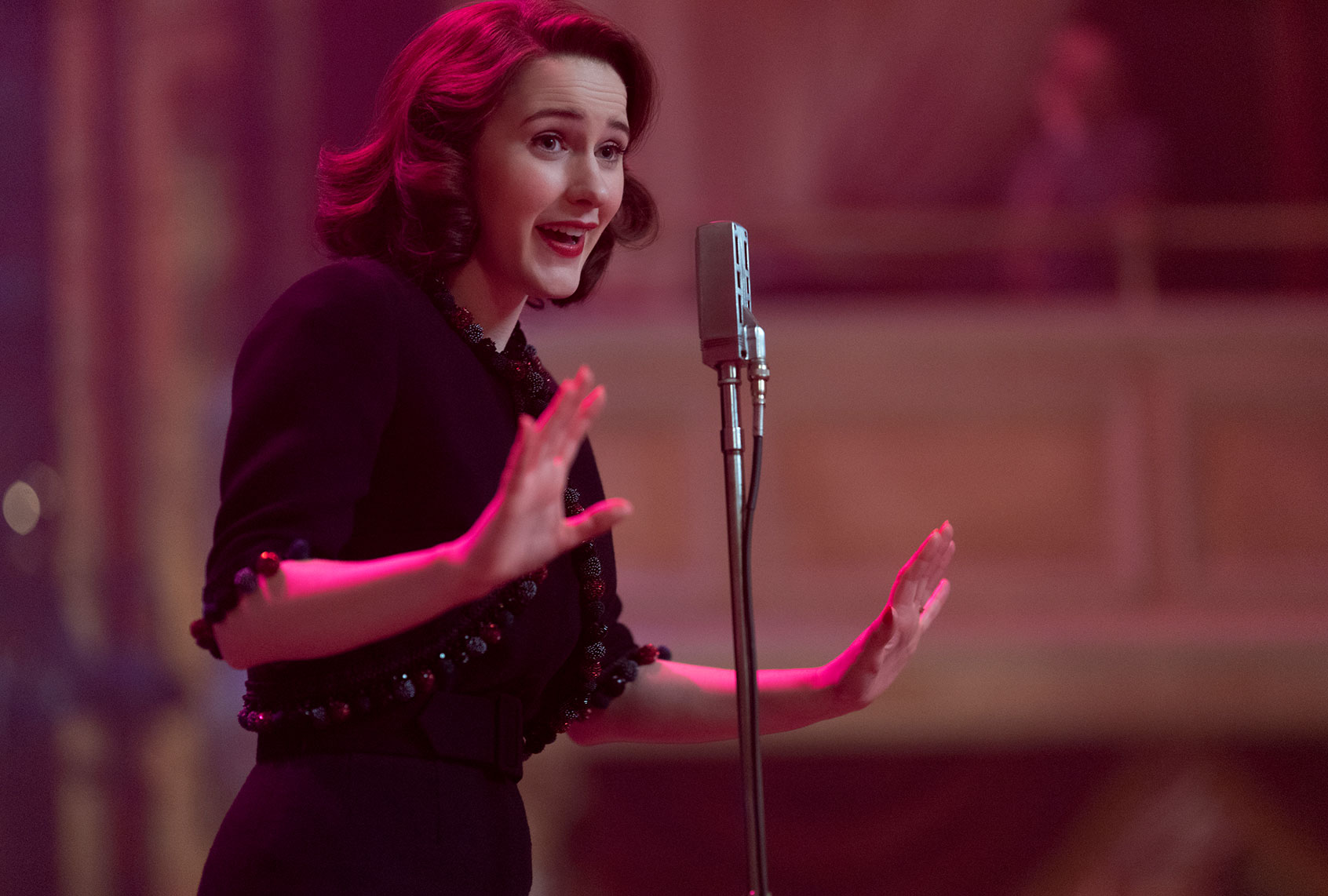When my son was very small, he never wanted to watch scripted TV shows, movies, or to read fiction books. As his mother is a novelist, this was upsetting. Eventually, he taught me that, at the time, he didn’t like conflict: the building block of most stories. He didn’t like it when characters got in trouble, as characters from Pete of “Pete’s Dragon” to Punky Brewster to Amelia Bedelia are wrought to do.
Only trouble is interesting. That’s what makes drama happen. Somebody wants something and will fight like hell to get it. Mishaps, mixed-up feelings and hijinks ensue. But usually, everything is straightened out.
“The Marvelous Mrs. Maisel,” Prime Video’s hit about a 1950s housewife who wants to be a comedian, is no exception. The main character, Midge Maisel (Rachel Brosnahan), is really good at getting in trouble. She’s also, as a wealthy, thin and traditionally attractive young white woman, good at getting out of it. What she’s not great at is apologizing.
Related: Susie’s struggle in “The Marvelous Mrs. Maisel”
Last season, the show ended on a cliffhanger of sorts: Midge and her intrepid manager Susie (Alex Borstein) stranded on a tarmac as a plane carrying Shy Baldwin (LeRoy McClain), the popular singer Midge was opening for on his worldwide tour, zoomed overhead without them on board, in a kind of anti-“Casablanca.”
Midge had been unceremoniously dumped by Shy’s manager, Reggie (Sterling K. Brown), on the tarmac after remarks Midge made earlier onstage at the Apollo Theater in Harlem, remarks about Shy that hinted, more than a little, about the singer’s sexuality.
Shy is gay, something Midge is privileged to know, as Reggie is, because Shy trusted her enough to tell her.
That trust was misplaced, as it turns out, the secret bursting from Midge in the anxious, stream of consciousness rapid fire that makes up much of her stand-up. She’s at her best, according to Susie and Midge herself, when she’s riffing, doing stand-up without notes, without a plan (and often, with lots of alcohol).
But riffing on your own life is one thing. Riffling about someone else’s, especially if that person is a closeted gay Black man in 1950s America, is something else.
Midge probably should have been fired. Placing your employer’s life in danger is likely grounds. So is being homophobic, as many of Midge’s digs veered into deeply mean and dangerous territory, referencing Judy Garland, Shy wearing makeup and having a massive closet of silks and chiffons. She described him as a “pretty, dainty, elegant thing, primping in the mirror,” called him “fabulous,” and said he “has a guy” for “just about everything” with a knowing, long look at the audience.
These remarks were for the approval of that audience, one she felt intimidated by. Midge threw Shy, her friend, under the bus to get that approval, the cheapest laughs she could buy.
It was damaging, what she did. It was cruel. But cruelest of all, in season 4 she has yet to apologize.
Breaking the law is funny in “Mrs. Maisel.” Unlike most girls who summer at a resort for a month, Midge has been arrested repeatedly, starting in the very first episode when she bared her breasts after drunkenly wandering onstage at the Gaslight, a club in the Village. As the fourth season of the show began, her arrest record numbered a neat four times. Bailed out by Susie, comic legend Lenny Bruce and ex-husband Joel, she’s faced little long-term fallout from repeated jail time.
 The Marvelous Mrs. Maisel (Courtesy of Amazon Prime Video)Midge should be relieved her sometimes-husband Joel, despite his many issues, is not vindictive in this regard (or knows he can’t handle being a fulltime dad); many women in similar circumstances might have lost custody of their children by now.
The Marvelous Mrs. Maisel (Courtesy of Amazon Prime Video)Midge should be relieved her sometimes-husband Joel, despite his many issues, is not vindictive in this regard (or knows he can’t handle being a fulltime dad); many women in similar circumstances might have lost custody of their children by now.
But repercussions are not the show’s strong suit.
Alan Sepinwall wrote in Rolling Stone about the aftermath of fellow “Maisel” comedian Sophie Lennon’s anxious opening night on Broadway, when she went wildly off script to the delight of the audience: “As with some of Midge’s own professional ups and downs, the fallout from the production doesn’t seem wholly thought through.”
Wouldn’t another audience want to see wild Sophie again (to box office cheers)? Would Midge really have trouble finding a place to perform after being kicked off Shy’s tour? Maybe. Or maybe the public would be curious to see this dangerous comic, even or especially not knowing the circumstances of her sudden dismissal.
Despite getting in a lot of interesting trouble in “The Marvelous Mrs. Maisel,” characters face no real consequences due to their wealth, which both shields them from judgement and paves the way forward into second, third . . . sixth chances.
Midge has learned this “nothing will stick to you/don’t look back” attitude at home. After leaving a cushy, tenure track teaching career at Columbia University (which had provided housing for his family), then quitting a job at Bell Labs, Midge’s father Abe is offered a new gig at the Village Voice. After running off to Paris, abandoning her family abruptly, Midge’s mother Rose comes home to a career as a matchmaker: She’s an overnight success.
Perhaps there is no greater metaphor for the lack of consequences than Midge getting to move her family back into her same old apartment on the Upper West Side, which magically has come up for sale.
Poor people don’t get the same kind of chances, the same kind of things just magically working out for them. And neither do people of color, which is perhaps why in the fourth season Shy rushes to the altar — with a woman — after Midge’s onstage outing.
In the fifth episode of this season, Midge and Susie get invitations to that wedding reception. And they go.
This is not the Yellowjackets’ triumphant return to the school reunion. Attending this reception feels like a terrible idea, and the show keeps the trouble coming with Midge and Susie committing immature, minor acts of wedding sabotage: pulling apart a floral arrangement, ordering the most expensive drinks at the open bar.
But that’s child’s play. When Midge purposefully punches a waiter’s tray of plate covers, causing him to stumble and drop them in the middle of Shy’s speech, her face in a furious scowl, I’m not on her side as a viewer. She’s punching down, and she’s lashing out without cause at an innocent bystander.
And when Midge follows Shy into the bathroom, anyone expecting an actual, sincere admission of wrongdoing from the woman who humiliated her friend at her own wedding by implying the religious woman was pregnant, will be disappointed.
“You had good comic for a while,” Midge tells Shy, her voice dripping with sarcasm. “Oh yes. Me. What happened there? Trying to remember.” She admits she “f****ed up” to Shy, but then quickly gets defensive, saying she was scared, intimated by the legendary Black woman comic who went on before her, and “desperate for that laugh . . . And I did kill, which was my job, but I should have gone in a different direction.”
There’s no Are you okay? Or: What happened after that night? Only: “I thought we were friends,” Midge says, like every bully in the world.
When the apology finally comes, it’s housed in self-protection and victim-blaming. “If you had just let me on the plane, I would have said I was sorry . . . I’ll get another job.” At last, we have it: “But I was and still am truly sorry.” It is brief and it feels, tacked at the end of her long speech about herself with additional, condescending jabs about him, not the most sincere.
Shy, to his credit, even though the homophobic insults from Midge could (and could still) have gotten him killed — Shy extends the olive branch. He offers to get together with her once he’s in town, take her out somewhere. But Midge rejects his friendship. “No,” she interrupts him. “I’m not falling for that again.”
Falling for what, exactly? A gay man trying to keep himself safe? Someone Midge hurt deeply doing his best — even though it’s not his place — to mend their friendship? “We’re not friends,” Midge says bluntly. “I’ve learned my lesson.”
What is that lesson? To not befriend gay people? It doesn’t seem to be not to out them. It doesn’t seem like Midge has learned anything. Then, in the worst part of a bathroom scene since the many of “Inventing Anna,” Midge says snidely to the man forced to marry, likely because of her thoughtlessness: “Congratulations. I hope you’re going to be very happy.”
Midge is in the wrong here. The audience knows this. Does the show?
Want a daily wrap-up of all the news and commentary Salon has to offer? Subscribe to our morning newsletter, Crash Course.
For a show, especially a long-running one, especially one just renewed for a final season, to continue to gather momentum and not become stagnant, there has to be movement. The characters have to go on a journey — and not just to get famous and richer. Midge has to change along the way, hopefully into someone better.
She hasn’t yet.
Where Midge differs from other antic-causing heroines like Lorelai Gilmore, Michelle Simms and yes, Punky Brewster, is that she doesn’t appear to be remorseful. This could be chalked up to her ambition. Midge is driven at a time when women were expected to stay home, have kids and be happy about it — or at least, to shut up about it. And she’s ambitious in a field where women were not expected to be at all.
But what set Midge apart at the beginning of “The Marvelous Mrs. Maisel” was her heart, cooking elaborate briskets because she knew people loved them, because she wanted to take care of people.
That heart so far is missing from season 4.
As a woman of this era, especially a privileged, sheltered one, Midge is still figuring things out. She went to college, unlike many women of her generation, but she’s been shielded from learning about money, the world and her own advantages in it. Susie has taught her a lot about life. So did Shy. And Midge owes him, at the very least, an explanation that she is still learning. And she owes him a real apology.
More stories like this
- The dark side of Joel on “The Marvelous Mrs. Maisel”
- Sorry, but forced apologies are the worst. Why can’t we quit this insincere ritual?
- The death of the public political apology


